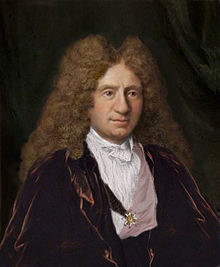Michel-Richard Delalande
Michel-Richard Delalande (also called Lalande or de Lalande) (born December 15, 1657 in Paris , † June 18, 1726 in Versailles ) was a French violinist , organist and composer . Because of his sacred works he was called in France the " Lully latin " (Latin Lully ).
Life
Born the fifteenth child of a tailor, he first worked in the choir of the church of Saint-Germain-l'Auxerrois in Paris. From 1672 he made a short career as a violinist, but did not get a job in the opera orchestra. From 1676 to 1680 he gradually became organist at four Paris churches, including Saint-Gervais as the successor to Charles Couperin . Here Delalande had to undertake to hand over the position to his son François Couperin as soon as he would have reached the age of 18.
At court he was harpsichord teacher of three princesses, the daughters of Louis XIV. Thanks to this activity, he had the opportunity to make his first profane works heard: La Sérénade in 1682 , Les Fontaines de Versailles in 1683 and Le concert d'Esculape . At the carnival celebrations in 1686 his Ballet de la jeunesse was performed by Lully instead of the Tragédie en Musique Armide .
In 1689, two years after the death of Jean-Baptiste Lully, Delalande became the king's musical favorite. With immediate effect he fulfilled the function of superintendent of court music. His compositional work mainly extended to church music ordered by the king. In 1722, the year his first wife died, he was accepted into the order of Saint-Michel by the regent Philip II, Duke of Orléans .
plant
Delalande's music is a synthesis of the French and Italian styles and continues the work of Marc-Antoine Charpentier . His music reaches its climax in the Grands Motets for soloists, choir and instrumental ensemble, for which up to 120 performers were planned. Some of these works were so popular that after his death they had over 600 performances in the Concerts spirituels between 1725 and 1770.
His oeuvre includes more than 300 well-known works, in addition to the 75 Grands Motets he also composed entertaining music, such as his well-known Symphonies pour les Soupers du Roy , 18 orchestral suites , ballets and variations on French Christmas carols, the "Noëls" that were popular at the time.
The British musicologist Lionel Sawkins published a catalog of works by Delalandes in 2005, which includes around 3,000 musical examples by the composer.
literature
- Bernhard Hemmerle : Delalande, Michel-Richard. In: Biographisch-Bibliographisches Kirchenlexikon (BBKL). Volume 23, Bautz, Nordhausen 2004, ISBN 3-88309-155-3 , Sp. 259-260.
Web links
- Sheet music and audio files by Michel-Richard Delalande in the International Music Score Library Project
- Sheet music in the public domain by Michel-Richard Delalande in the Choral Public Domain Library - ChoralWiki (English)
footnote
- ↑ See booklet text on CD: Michel Richard Delalande - Te Deum (+ Super flumina Babilonis and Confitebor tibi Domine ), Les Arts florissants, William Christie, harmonia mundi, 1991/2001, p. 4 (French)
- ↑ See booklet text on CD: Michel Richard Delalande - Te Deum (+ Super flumina Babilonis and Confitebor tibi Domine ), Les Arts florissants, William Christie, harmonia mundi, 1991/2001, pp. 8–9
- ^ Lionel Sawkins: A thematic catalog of the works of Michel-Richard de Lalande (1657–1726) , Oxford University Press, 2005, 700 pages, ISBN 0-19-816360-6
| personal data | |
|---|---|
| SURNAME | Delalande, Michel-Richard |
| BRIEF DESCRIPTION | French violinist and composer |
| DATE OF BIRTH | December 15, 1657 |
| PLACE OF BIRTH | Paris |
| DATE OF DEATH | June 18, 1726 |
| Place of death | Paris |

